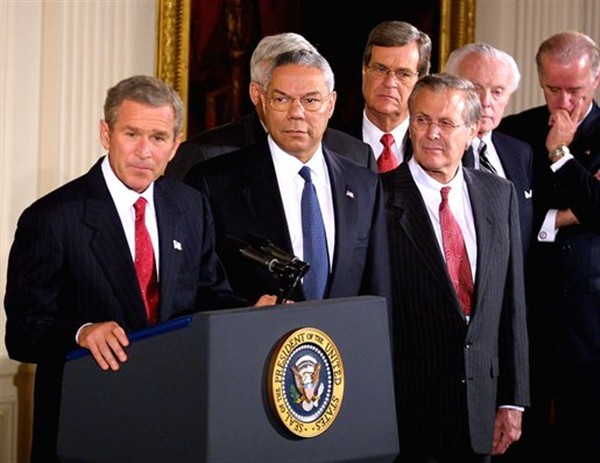by Daniel Luban
In recent days, several Republican presidential candidates and pundits have suggested that the George W. Bush administration’s 2003 decision to invade Iraq was justified on the basis of “what we knew then,” not “what we know now.” The problem, they’ve argued, sprang from the faulty intelligence given to the administration, not the administration’s own distortions of this intelligence in its zeal to go to war. In support of this view, National Review senior editor Ramesh Ponnuru admits that the administration “overstated the extent to which the available evidence” backed up their case, but denies that “this exaggeration amounted to dishonesty.” Bush and his followers genuinely believed that Saddam Hussein had active weapons of mass destruction (WMD) programs, so they couldn’t have been lying about them.
This is a common defense of Bush and his allies, but a moment’s reflection will demonstrate that it doesn’t hold water. To see why, consider a brief example.
Suppose Tammy and Tommy are on the playground at recess. Tammy goes off to play for a few minutes; when she returns, she discovers that her Twinkie is gone. She glares at Tommy; he smirks back at her. The little stinker—of course he took it, she can feel it in her gut! She goes off to tell the teacher that Tommy stole her Twinkie. As it happens, he’s innocent. He’s smirking because he saw Tammy’s little brother Sammy run off with it. But is Tammy lying about Tommy taking the Twinkie? No, she’s just wrong.
Now suppose that Tammy is not confident that her gut feeling will be enough to persuade the world that Tommy took the Twinkie. Suppose she goes to the United Nations to make her case, where she insists that a survey of “all relevant information” provides hard “evidence, not conjecture” proving her accusations—“facts and conclusions based on solid intelligence,” not mere “assertions.” Suppose she sets up institutional mechanisms designed to publicize intelligence unfavorable to Tommy, however flimsy, while suppressing intelligence favorable to Tommy. Suppose her public accusations are so misleading that even her allies complain that “the intelligence and facts [are] being fixed” to pin the blame on Tommy.
Is Tammy now “lying” in the case of Tommy and the Twinkie? Yes, of course she is. Not about the bare fact of whether he took it—she’s simply wrong about that—but about the evidence in support of this fact. If someone knowingly and egregiously overstates the evidence they possess in support of a claim, they’re lying even if they actually believe the underlying claim.
I don’t doubt that Bush and his underlings believed in their guts that they would eventually find some WMDs. They might have suspected that what they found wouldn’t match what they were publicly claiming in the run-up to the invasion but still believed that they’d at least find enough to justify the war ex post facto. (This is separate from the question of whether WMDs were simply a pretext for the invasion; something can be a pretext even if one genuinely believes it, provided it’s not the main motive for acting.) Like Tammy, however, they worried that their gut convictions, combined with the inconclusive intelligence, would not be enough to convince the world about Saddam’s WMD programs. So they decided to bolster the case, in the course of which they “overstated,” “exaggerated,” and, yes, lied about the evidence in their possession.






But, Because Poppy!
@Don Bacon – Right to the point as usual!
Bush lied , my friend died !
But it should never be forgotten that BEFORE he was elected, Bush was quoted as saying that being a Commander in Chief was the key to a successful presidency and even elaborated on that idea. Those who voted for him should have realized that he as much as said he would “need” a war. Cheney nominating himself for VP should have been another red flag. So many lives are gone for what? See above.
Daniel, two excellent sources:
Norman Solomon’s “War Made Easy” — How Presidents and Pundits Keep Spinning Us to Death.
Walter Karp’s “The Politics of War” — the story of two wars which forever altered the political life of the American Republic (1890-1920) – McKinley and Wilson